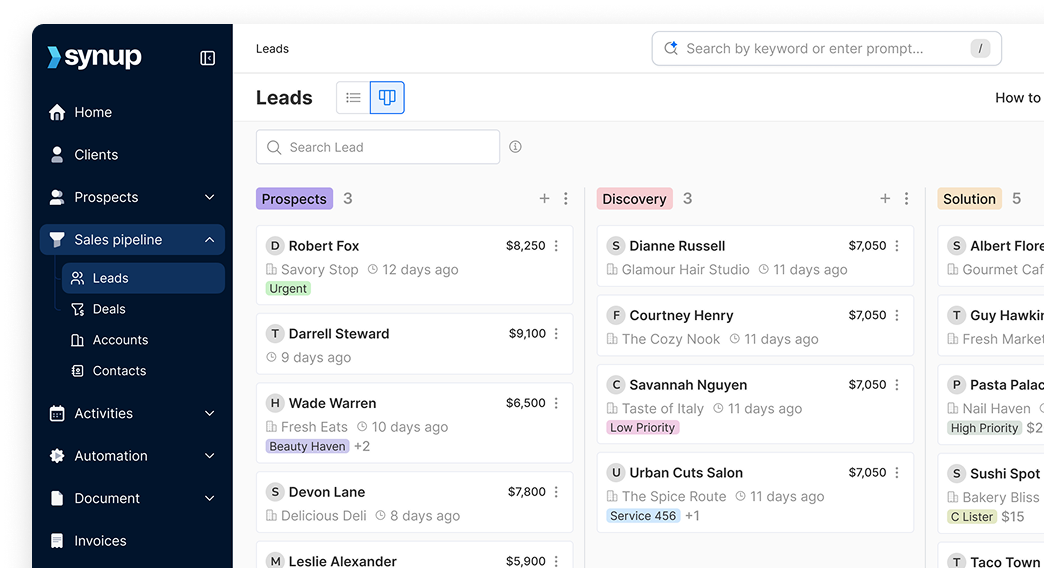How to do Local Keyword Research for Your Business – A Guide
Looking to boost your local business's online visibility? Learn how to conduct effective keyword research in this user guide from Synup.com.
What is Local Keyword Research and why is it essential for Local SEO Success?
If you’re a local business, local SEO needs to be part of your SEO strategy. Local SEO focuses on searches made with local intent - aka consumers searching for “____ near me.” If you’ve been neglecting your local SEO, it’s time to shape up:
76% of people who search for a nearby business visit within a day’s time. And when it comes to local searches, 28% of searches end in a purchase.

Those are some crazy numbers. Because local searches are often made when a consumer is ready to purchase, investing in local SEO results in a huge revenue boost. When you check the search volumes for local-focused keywords, you might be put off by the low numbers. But while these terms may rank low in terms of search volume, the customer’s search intent is high.
Investing in your local SEO strategy will benefit your business for years to come. And it all starts with proper keyword research! Some of the benefits to local SEO include:
- Increased foot traffic
- Increased visibility
- Higher quality leads
- Tapping into new markets (like local online shoppers)
- Boosted revenue
- Fostering trust with existing and potential customers
Targeting local keywords and finding more local shoppers should be every brick and mortar business’ top priority. Luckily, Synup is here to help. Once you understand it, local SEO isn’t all that different from the SEO we know and (sometimes) love. Local SEO just targets your audience more specifically, rather than casting your net into a wide pond.
But don’t think that local SEO is as simple as optimizing your pages for “____ near me.” Local SEO takes work! Specifically, to succeed at local SEO, you need to nail your local keyword research first. Let’s dive in.
How to do Local Keyword Research?
When you break it down, local keyword research isn’t all that different from standard keyword research. Still, there are some essential things to consider when crafting your local SEO strategy. Keep reading to learn how to effectively research local keywords!
Find and list your products & services
Listing your business’ products and services gives you a solid foundation for further keyword research. Basically, we want to brainstorm the various products, services, and attributes of your business that a customer might search for.
For example, if your business is a coffee shop, you might include some of these in your list of business attributes:
- Work space
- Bakery
- Coffee shop
- Sandwiches
- Coffee
- Tea
- Pastries
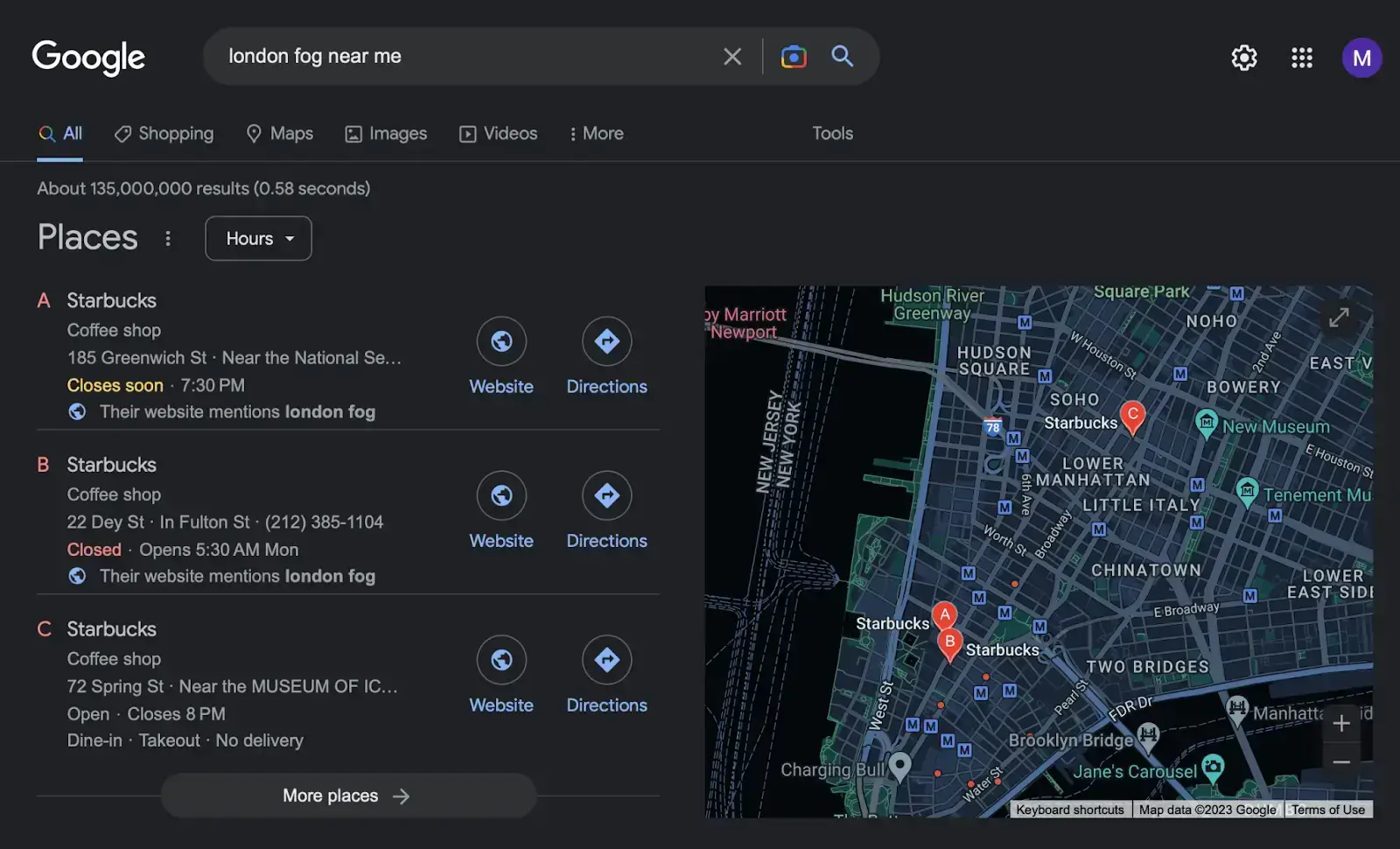
From listing menu items to different services you offer, creating an initial list will serve as a jumping off point for your local keyword research. After all, your business isn’t just a “coffee shop.” It’s a place to do work, a cozy environment to catch up with a friend, a purveyor of food, and even a convenient bathroom. Brainstorming a list will help you encompass all that your business is and does.
Try to leverage industry keywords. Think of things that relate to your business. Whether it’s coffee drinks and baked goods or dog grooming and nail trims, it’s essential to create a comprehensive list of related keywords to jump off of.
Once you have these core ideas about your business and its products and services, you can use modifiers to flesh out your list. A modifier can be anything from a rating (best coffee) to an event (pastries for bridal showers) or a service offered (breakfast delivery).
Using modifiers to expand our list above, we might include keywords like:
- Quiet work space
- Best bakery
- Coffee delivery
- Top French pastries
- Vegan sandwiches
Now, add location-based phrases to your keywords. After all, we’re focusing on local searchers! Adding our local phrasing would give us keywords like:
- Vegan sandwiches downtown nyc
- Best bakery FiDi
- Coffee delivery nyc
- Quiet workspace Wall Street
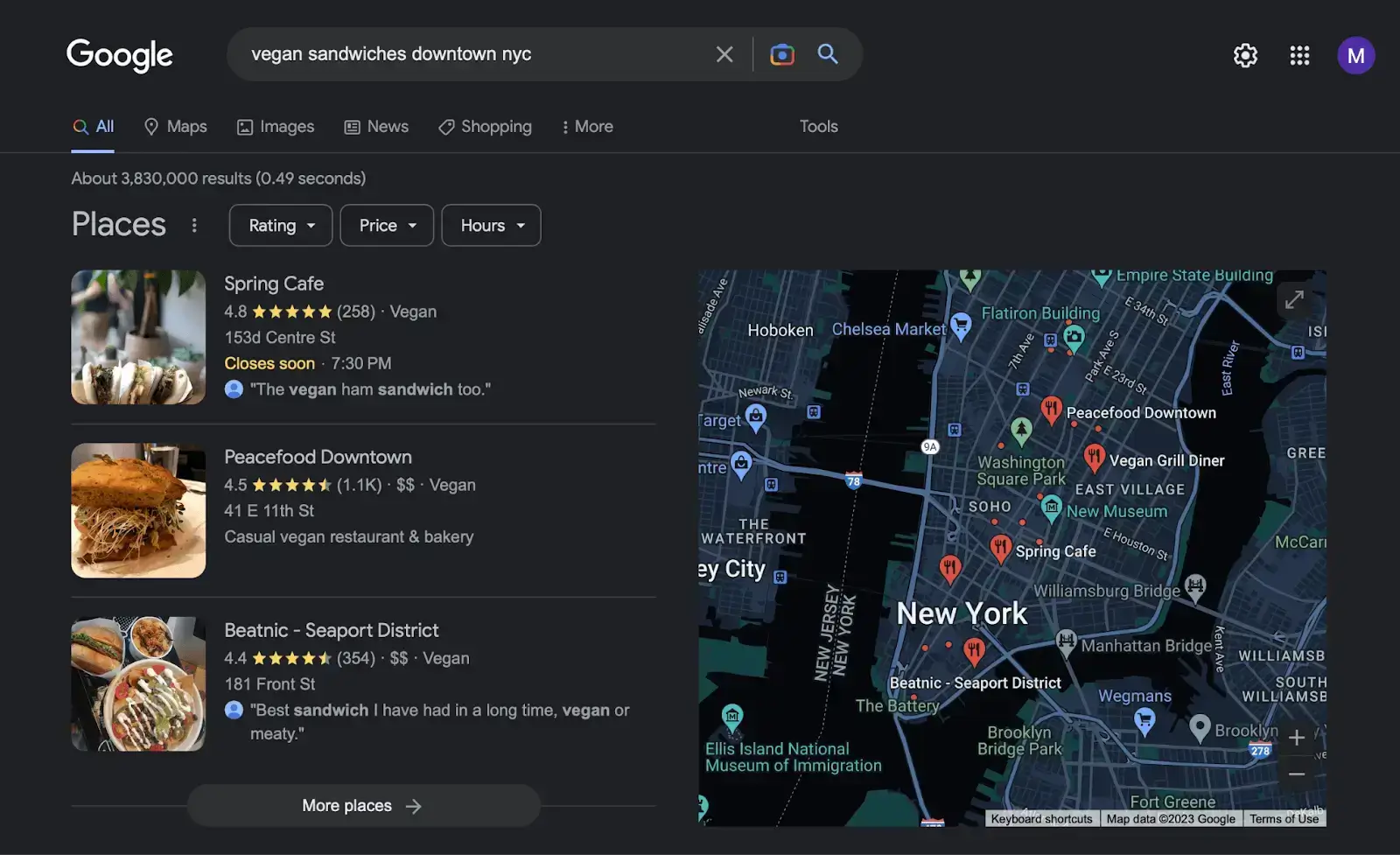
Now, you should have a pretty extensive list. You can check whether customers are actually searching for these terms next. Once you have an initial list, you can use a variety of tools to help you expand your list and come up with a great collection of target keywords for your local SEO strategy.
Free tools to find local keywords
As you continue your local keyword research, don’t neglect the bevy of helpful SEO tools. Google Trends and Google Keyword Planner are the most popular free tools - but even the Google search bar can be helpful as you create your list of target keywords.
Google loves local searches. 80% of searches are made with local intent - so Google favors local listings that are close and relevant to their searchers. Since you’re competing locally - not globally - it’s easier to compete. But there’s much less space. When it comes to local rankings, it’s essential to nab a top 3 spot for any given keyword.
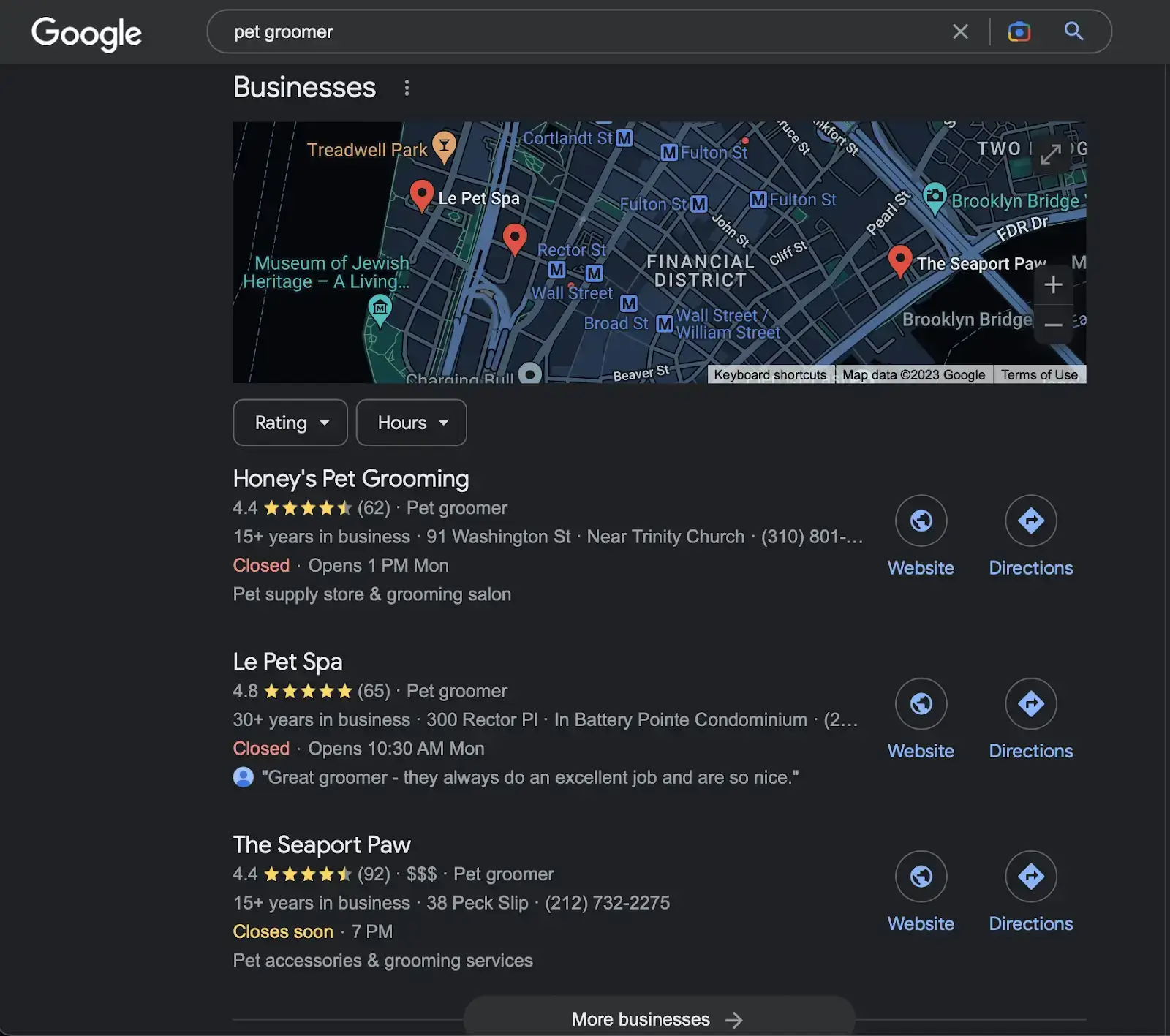
How to check local intent?
Local SEO is about ranking for keywords with local intent (searchers are looking for local services specifically). So then you need to check that the searchers actually want to find local products.
The easiest way to check local intent is to search Google for your business’ products or services. Google personalizes the results using your location. You can check a keyword’s local intent by searching it and seeing if the results display local businesses with a “map pack.” You can also check intent by seeing if the organic search results are local businesses or not. If local businesses appear when you search for a keyphrase, those keywords have local intent - bingo!
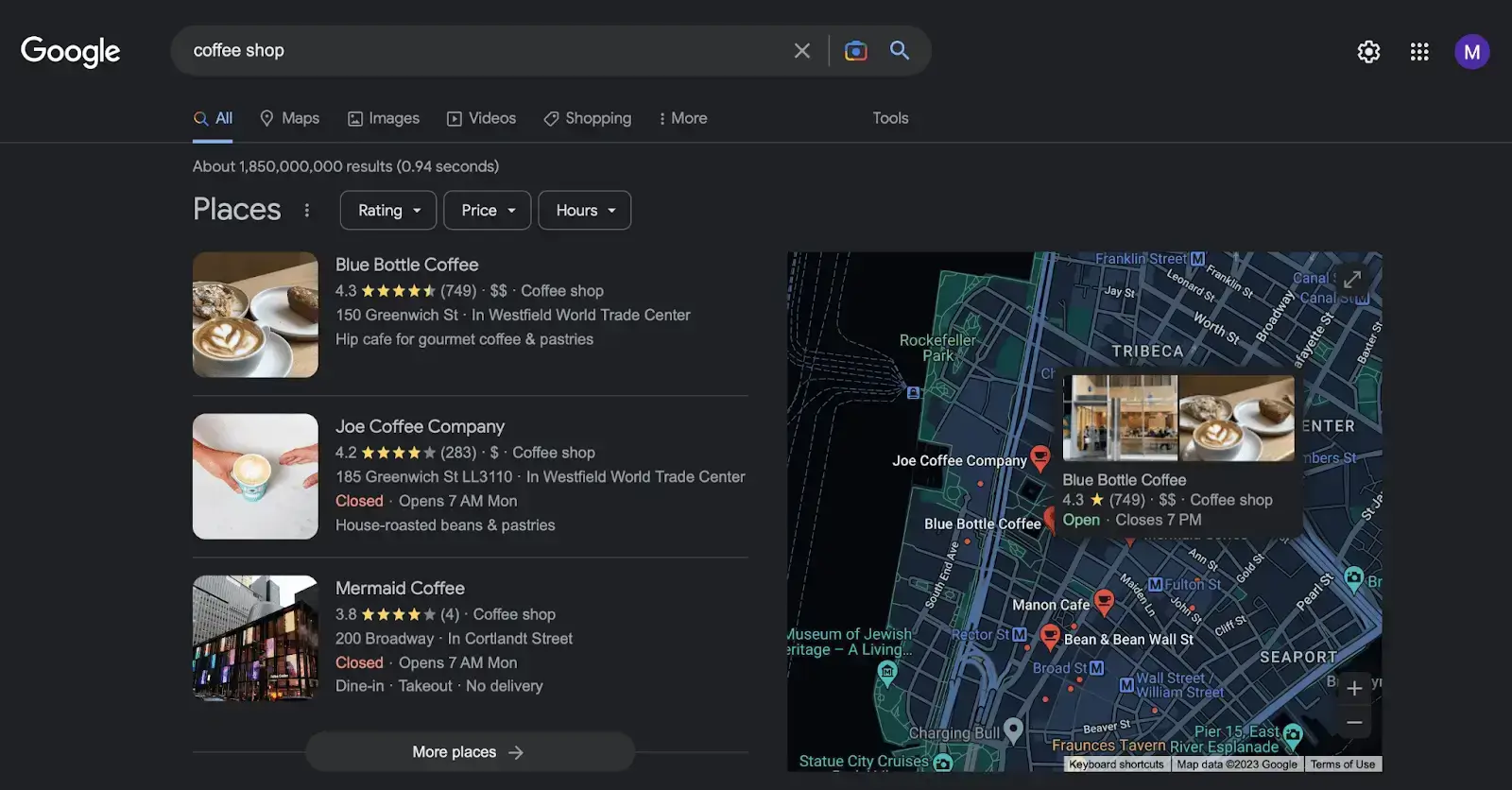
For example, a search for “coffee shop” yields local results, highlighting the local search intent.
The map pack is a sure sign that a keyword search has local intent. But even without a map pack, Google may display a list of local businesses - indicating local intent.
Here’s what it looks like when a search doesn’t have local intent. Searching for Philz Coffee (a popular brand on the west coast) doesn’t yield local search results because there aren’t any Philz Coffee shops nearby. So someone in New York searching for Philz would likely be searching to purchase coffee beans or other Philz merchandise (rather than searching for the locations to visit in-person).
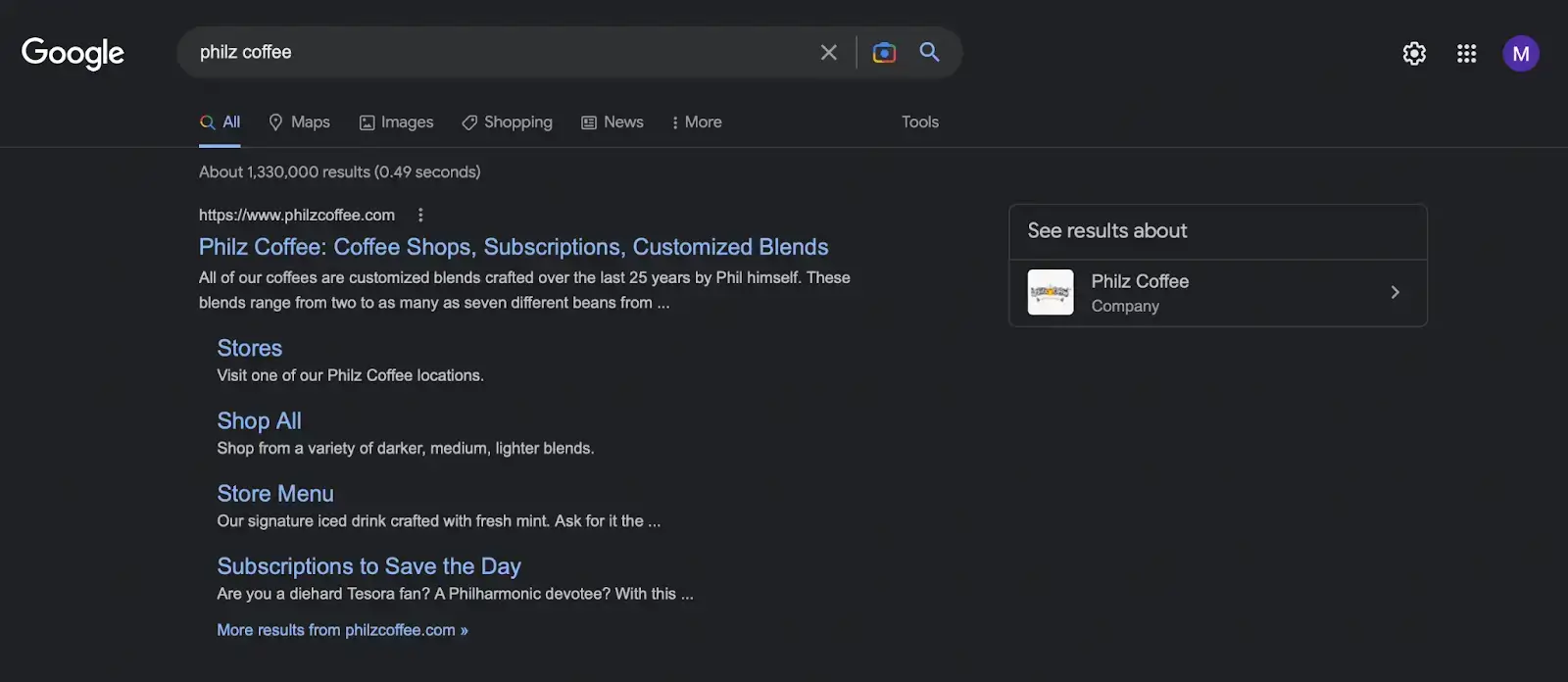
When dealing with a high volume of keywords you want to track and rank for, it can get overwhelming. Luckily, using technology like ChatGPT can help you classify and sort keywords.
Here’s what that looks like:

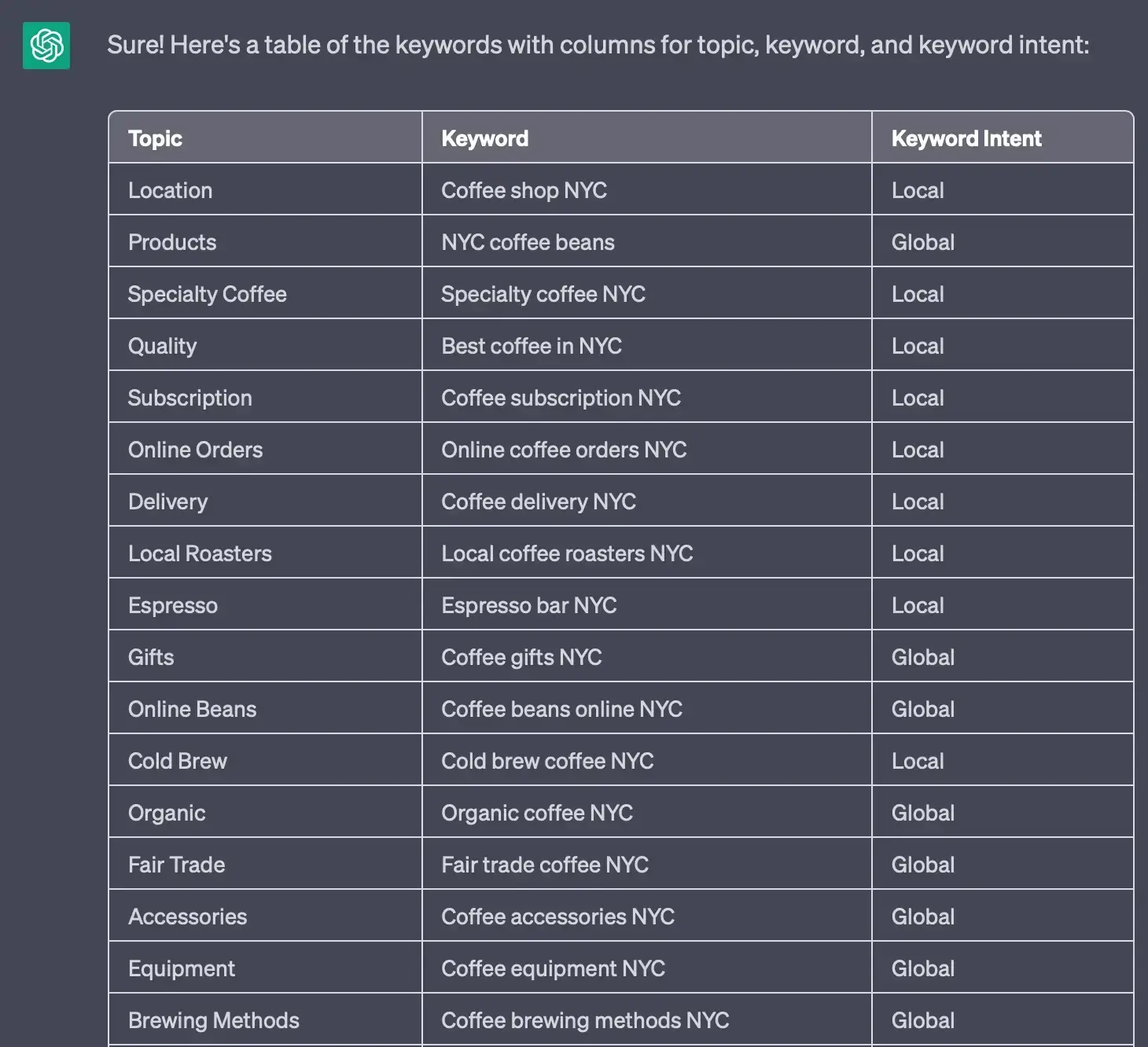
To sort keywords by intent, you can feed ChatGPT a list of keywords and key phrases that you want to rank for. Then, ask ChatGPT to sort them by topic, keyword, and intent. This way, instead of searching for each of your target keywords individually to see whether they have local intent, you can just feed your keyword list into ChatGPT and have the AI sort it for you.
This is a great way to sort keywords and save yourself a lot of research on the back end! After you sort your keywords and determine which ones are being searched with local intent, you’ll be able to continue the process of building out your local SEO strategy.
Find keyword search volume
Once you have your list of target keywords with local intent, you might want to check the local search volumes. This is standard practice when it comes to SEO, but it gets tricky for local search. Why? Well, most SEO tools only show search volumes on a nationwide or global scale.
This makes sense because most of the time, businesses are only interested in the overall search volume for a certain term. With traditional SEO, it doesn’t matter where the customers are - only that they’re searching. But for local SEO, we need to determine whether our terms are being searched for at a local level.
Using Google Keyword Planner is helpful when it comes to finding search volumes for local keywords.
Here’s how to do it:
- Go to Google Keyword Planner
- Click on “Get search volume and forecasts”
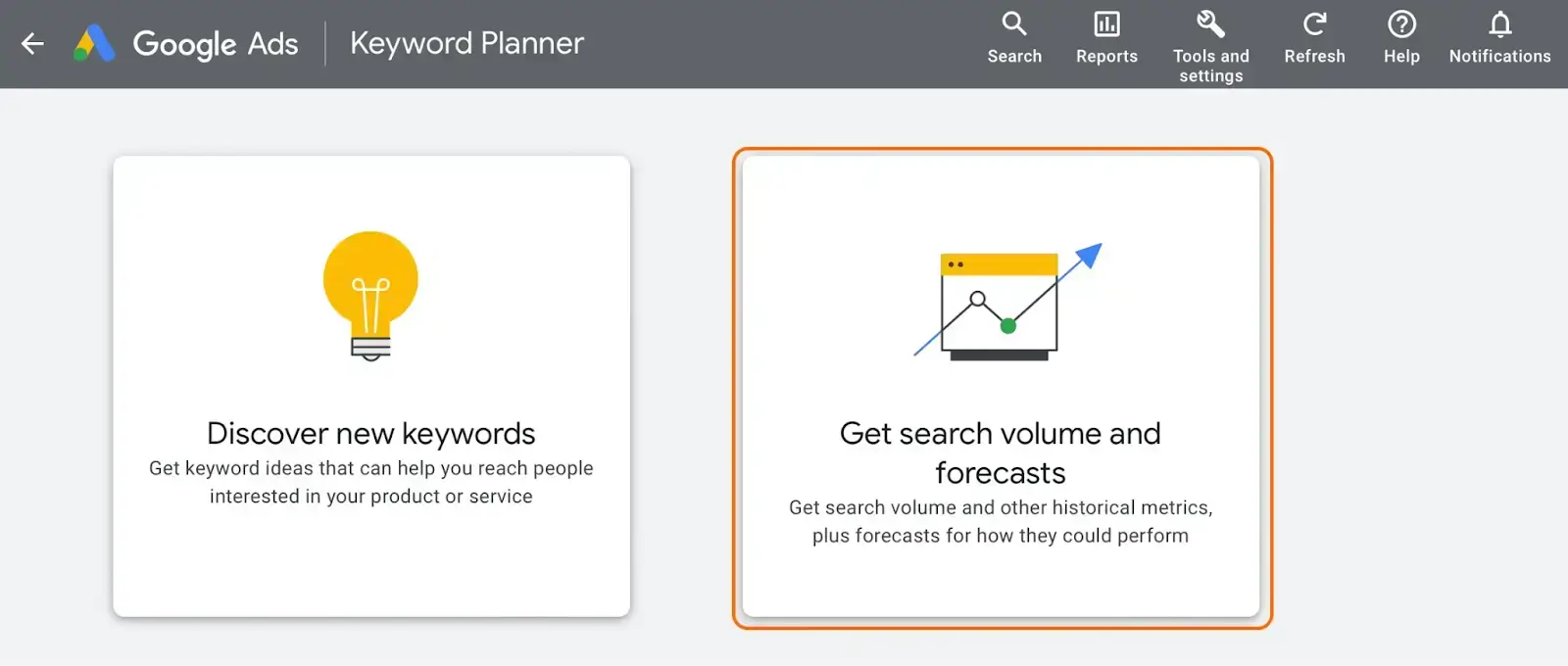
- Enter your keywords
- Change the location to your business’ local area
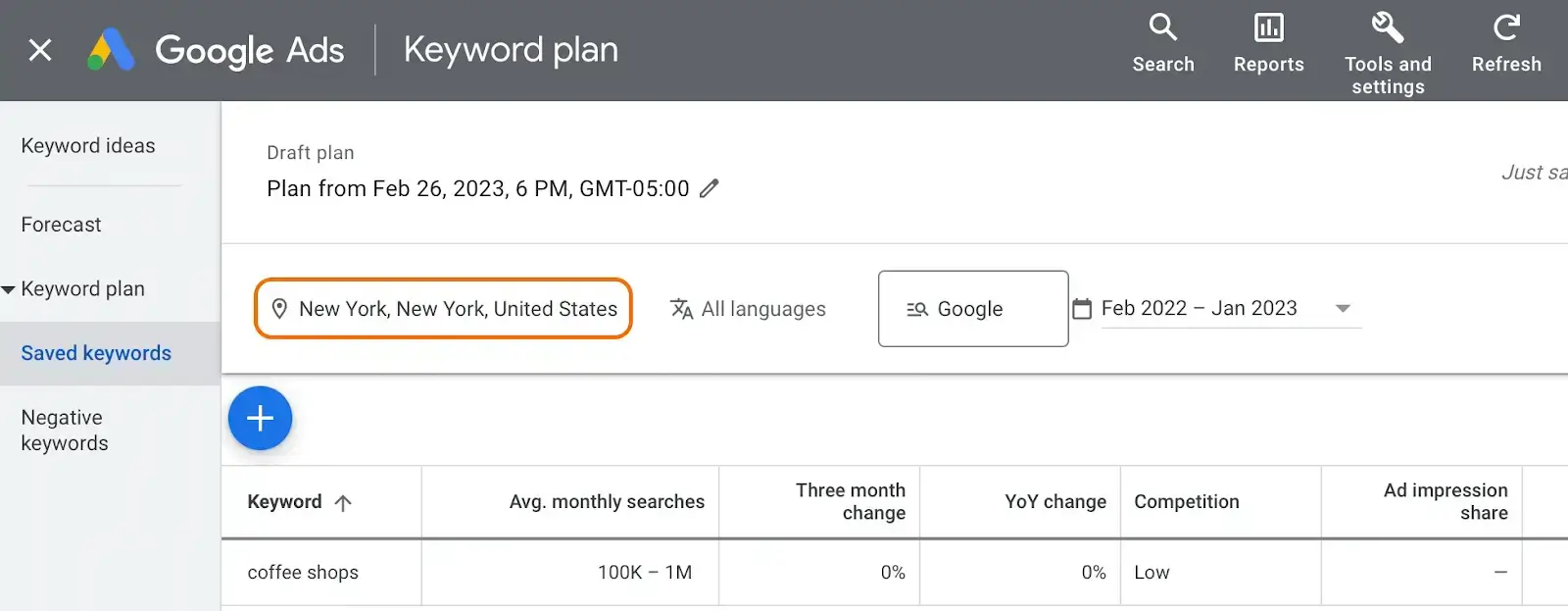
Here, you can see how many people in your area are actually searching for business-related keywords. Rather than viewing search volume on a global scale, you can target specific markets to see which keywords you should prioritize in your local SEO strategy.
When it comes to local SEO, search volume shouldn’t be your biggest concern. Search volume should guide how you prioritize keywords - but don’t let it dissuade you from optimizing for lower-volume phrases. After all, the beauty of local search is that searches with local intent are more likely to convert. These high-quality leads are nothing to scoff at.
Even if the search volume for a certain keyword is low, you should still create a page for it. This will help customers looking for your products or services locally find your business seamlessly. If the search volume seems dismal to you, always keep in mind that local searches convert like crazy! Even if only a few people are searching for “vegan sandwiches downtown nyc”, chances are that they want a vegan sandwich in downtown NYC, and they’ll get one whether or not your business is on that list. Ensure that customers find you by including content for any relevant local keywords.
Optimizing content for keywords and related terms
When writing content for local keywords, it may seem fruitless to write content for the more general keywords. And it’s tricky! Often, Google will show your content to a wider audience - meaning the majority of people who see your content may not even by local to your business. So why bother?
Well, even if 99% of searchers aren’t local to your business, chances are that your customers want and need the same content. Although writing and posting about why to take your dog to the groomer isn’t necessarily a local issue, your local customers will appreciate the information - and a reminder! Plus, it’s important to remember that Google prioritizes websites and pages with topical authority. So the more you post about relevant topics, the more likely your pages are to show up to potential customers (on a global or local scale).
That being said, here are some ways to incorporate your new keywords into your content.
As with all content, your main focus should be solving your customers’ questions and problems. For example, if you’re a dog grooming business, you should address concerns like:
- How often should I take my dog to the groomers
- How to find a trusted dog groomer
- How to clip a dog’s nails
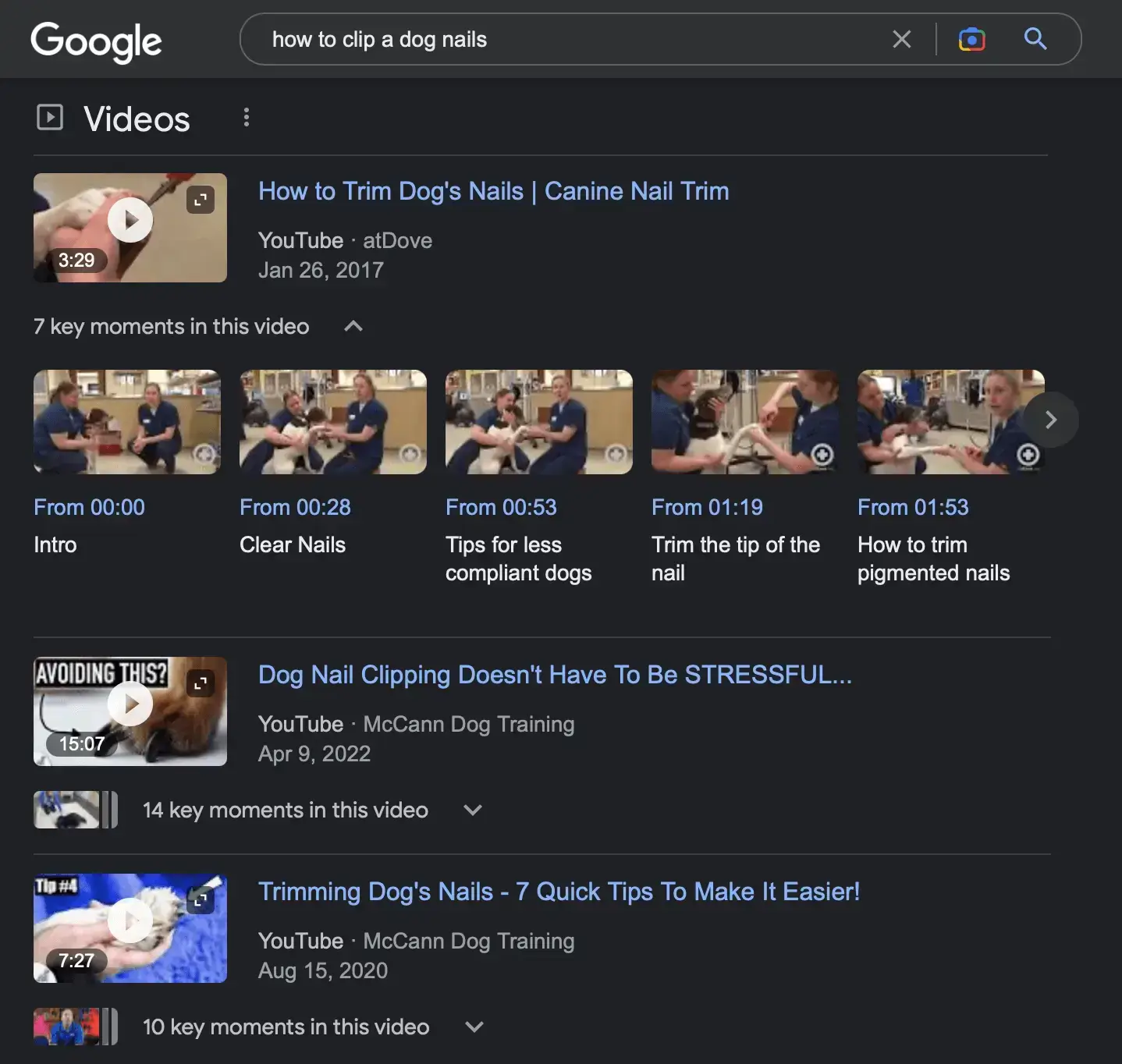
For example, searching “how to clip a dog’s nails” doesn’t yield any local results. But Google shows results (in this case, mainly videos) from various animal care providers. If the searcher were located near any of the businesses with videos on how to clip a dog’s nails, they might consider taking their dog to that business next time they needed a groomer!
Producing content in line with your local keyword research can help customers find your business or learn more about your services!
You can also add local-focused phrases and keywords to help encourage your content to show up for local searchers. Even simple phrases like “Now serving the Chicago area” help garner local attention!
When you have multiple locations, though, sprinkling in these phrases isn’t necessary. Here’s what to do instead.
Keyword Research for Multiple Locations
For businesses with multiple locations, it can get confusing trying to figure out how to manage and rank in local search. Luckily, there’s a simple answer to this problem.
Creating landing pages for each business location will help tell Google where your business is located, so Google can direct local searchers to your business.
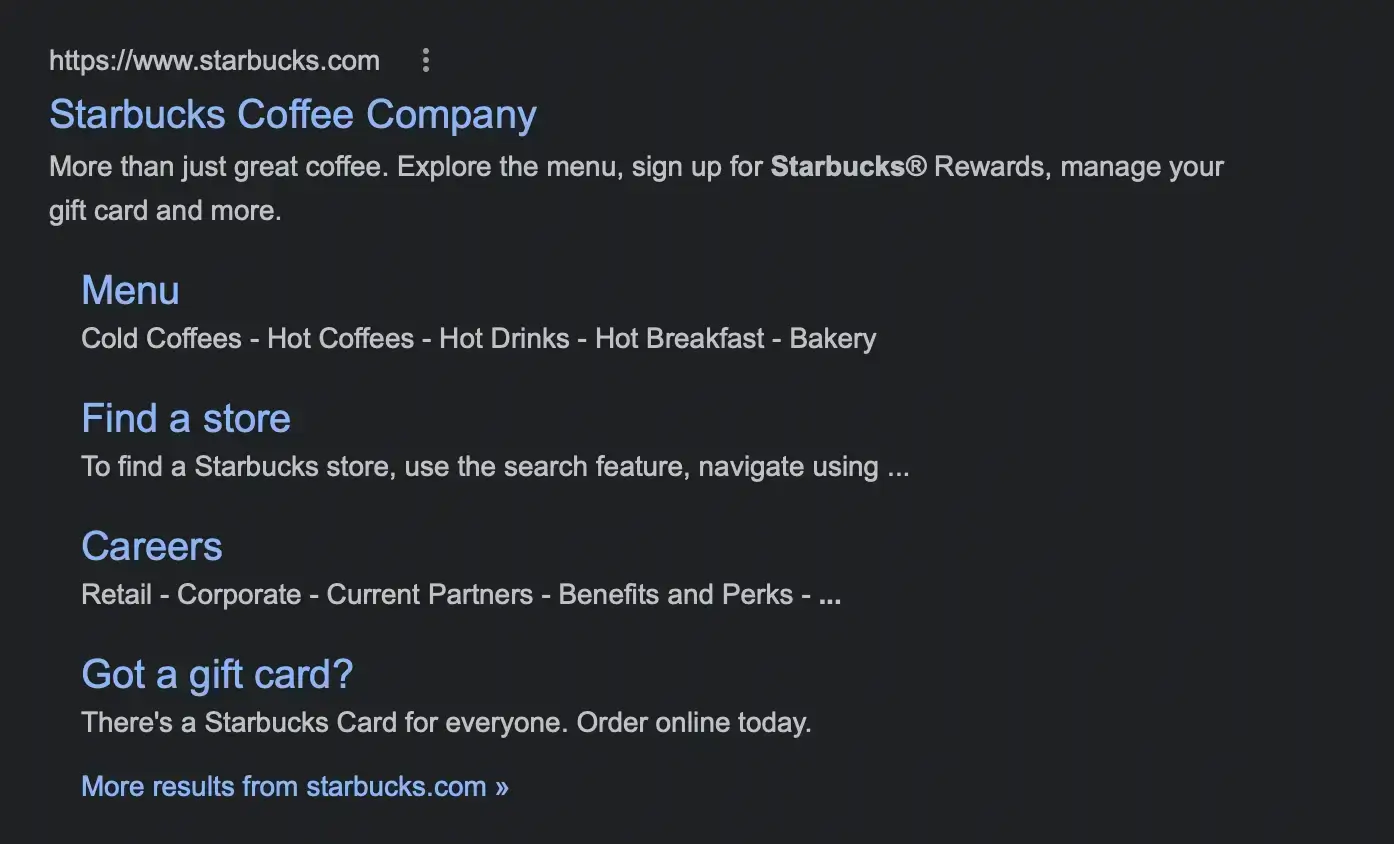
Often, the “find a store” feature on websites serves as a hub for all local landing pages. This will help Google classify your business locations properly, displaying them for local searchers who are looking for your products or services.
You can also post to your local pages to reinforce your locations - like saying “visit us on Main Street this weekend!” in your local posts.
Using a store page management system can be helpful for this. After all, it’s essential to build and manage a local presence for all of your business’ locations. Building an online presence for every aspect of your business helps customers find you, driving conversions with customized web-pages for all of your locations. Plus, this makes it easier to effectively manage your individual stores’ hours, services, and driving directions for customers.
Having individualized pages also makes it easier to track what your stores are ranking for.
How to Track Ranking for Local Keywords
Monitoring your results is perhaps the most important part of any SEO endeavor, whether you’re focusing on local SEO or general SEO.
You’ll need a keyword tracker to track your local keywords - just like you would with any keyword. Using a tool like SEMRush or Synup can help you monitor your ranking. Free tools like Google Search Console can be helpful, too - but they sometimes miss crucial local insights!
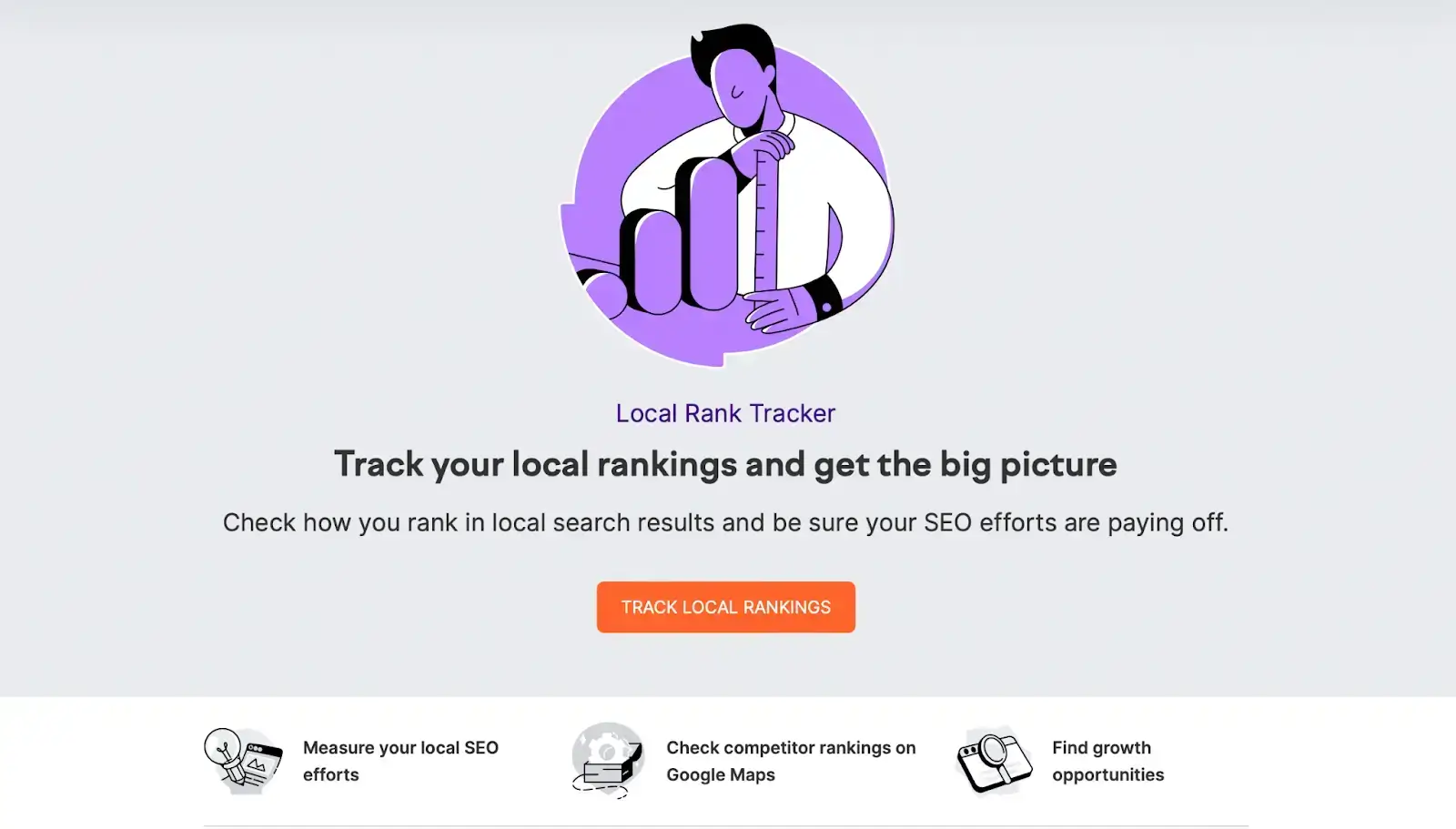
You can often track what customers are using to search for your business - directly from listings sites like Apple and Google. While this isn’t a replacement for ranking tracking, it can be helpful as it shows which search terms you should be prioritizing!
More improvements to your Local SEO
Local search is a unique beast due to the many factors that contribute to your local ranking. For example, Google considers factors like:
- The searcher’s location
- The sentiment and keywords in online reviews
- Name, address, and phone number consistency across the web
- Your Google Business Profile
- Your Google rating
When properly managed, though, you can build a local SEO strategy that thrives. To further improve your local SEO, Google offers these tips:
- Improve visibility in local search by verifying your location
- Update your business hours, especially around holiday times. There’s nothing worse than going to a store only to find it closed!
- Manage and respond to reviews. Review management is essential - positive customer interactions fuel loyalty and inspire trust. Plus, they increase visibility!
- Adding photos and in-store listings showcase your store and products, giving customers a deeper understanding of what you’re selling and whether the products are right for them.
Alongside proper local keyword research, these tips can help build the foundation for a strong local SEO strategy.
Conclusion
Now, you should feel confident in your local keyword research abilities! By prioritizing local SEO as part of your overall SEO strategy, you can ensure that your business attracts customers and gets high-quality, local leads.
Remember to continually update and improve your local SEO strategy. By continually conducting local keyword research, you can ensure that your business stays relevant and continues to rank locally.
As with normal SEO, local SEO is a continual process. It’s a marathon, not a sprint! And things are always changing in local search. To stay on top of your game, make local search a priority. From new competitors and changing customer interests to changes in your own business, local keyword research will ensure that your business stays relevant.
When done correctly, local SEO has the potential to seriously impact your bottom line. As a brick-and-mortar business, local customers are your best asset! Even in the era of online ordering and delivery services, many customers are still choosing to shop locally. Whether it’s a cup of coffee, a weekly grocery trip, or a trip to the groomers, local businesses are still an essential part of all of our lives.
After all, as a local business, it’s essential to cater directly to the customers who are actually nearby. They’re looking for your business - you just need to help them find it.




